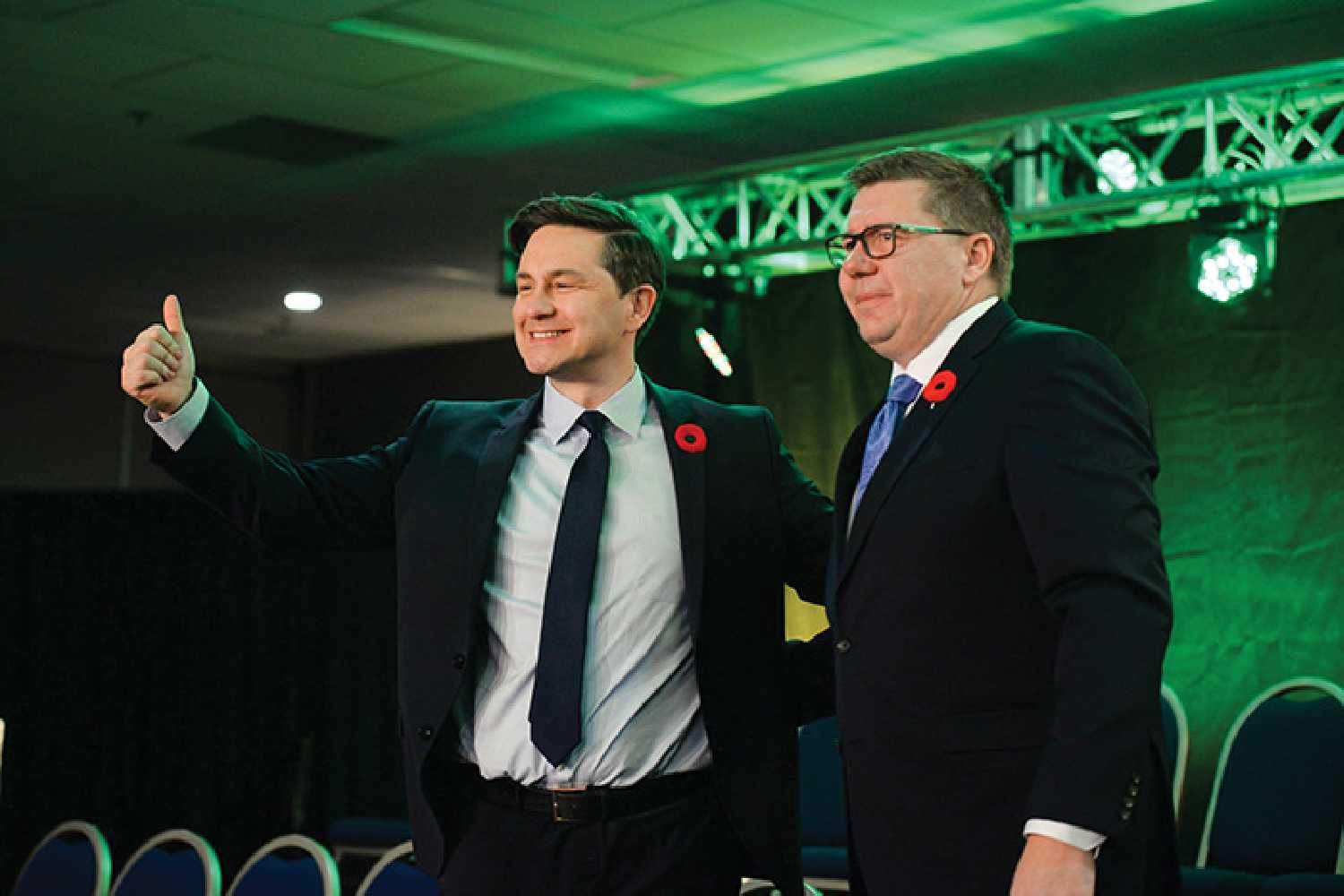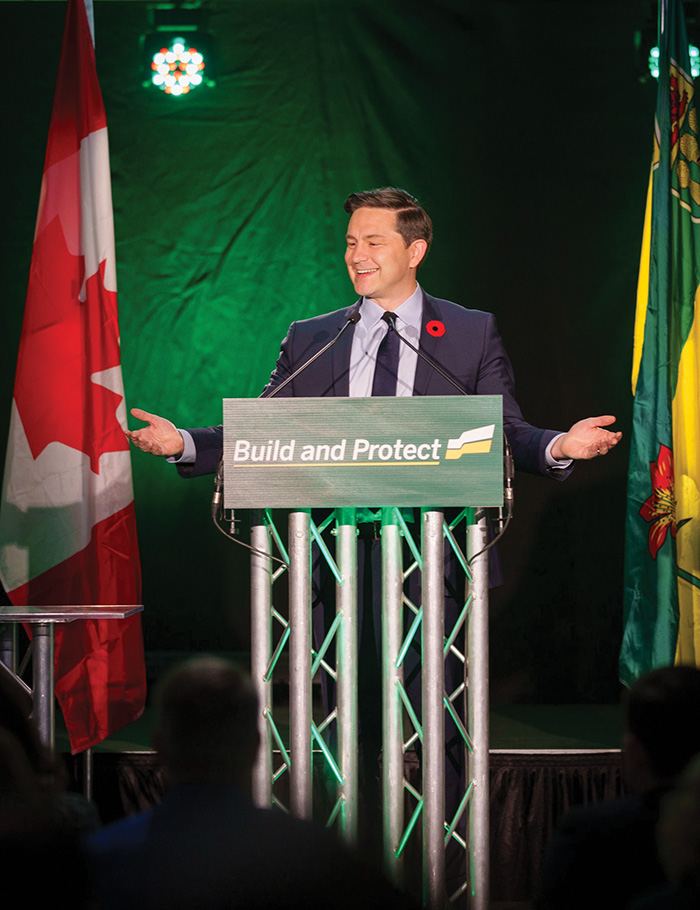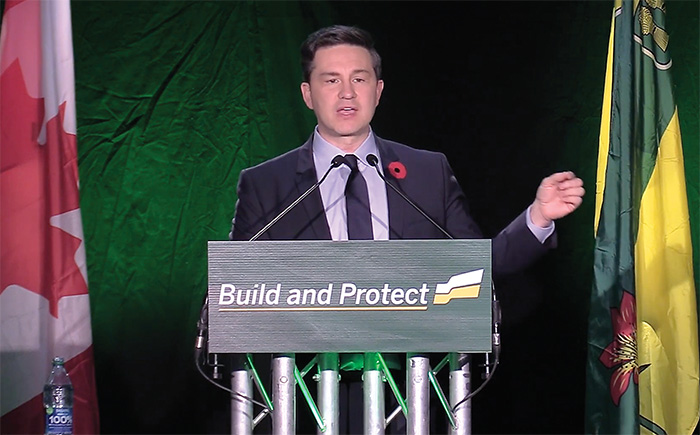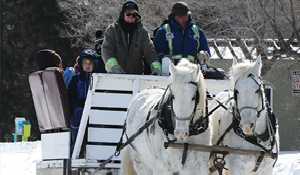Poilievre visits Saskatchewan
November 10, 2023, 9:24 am
Kevin Weedmark


Federal Conservative Leader Pierre Poilievre was in Saskatchewan recently to address the Saskatchewan Party convention.
Editor Kevin Weedmark spoke to him about some of the issues facing the country.
The full interview is below:
So how did it feel addressing the crowd at the Sask Party convention?
It was great to join the Common Sense Saskatchewanians in my effort to “axe the tax” and bring home lower prices. So I want thank Premier Scott Moe and other great Saskatchewanians for the chance and I can’t wait to bring home lower costs and more powerful paycheques for the people.
Judging by the polls, your message seems to be resonating with a lot of Canadians now. What’s making the difference?
Well people are fed up and they realize that Justin Trudeau and the NDP are not worth the cost and they want a Prime Minister who will bring home lower prices by axing the carbon tax and ending the inflationary deficits. They want to bring home powerful paycheques with lower income taxes that rewards hard work. They want to bring home our energy jobs by ending the unconstitutional C-69 so that we can produce more of our energy on our soil and keep our money here for our people.
From the very beginning people have been pointing out what they see as some of the inconsistencies and contradictions on the carbon tax. Now with what’s happened with the pause on home heating oil as it relates to carbon tax, has the federal government painted themselves into a corner here? Are the calls for a blanket exemption on home heating going to lead somewhere or where do you think that this is going to end?
It’s going to end when I become Prime Minister and I axe the tax, but in the meantime Trudeau is twisting himself into a pretzel trying to explain why he is pausing the paying for oil heat while racheting up the paying on people who use cleaner, natural gas and propane.
So none of it makes sense and it’s all a scrambling, desperate Justin Trudeau flailing around and trying to dupe himself into power. He is only concerned with one thing and that is only keeping his job, as his other MPs are telling him that he’s not worth the cost.
He’s like, “Ok, I’ll give you an exemption for a couple of years if you’ll keep me around as leader.” Canadians shouldn’t have to pay for that. It’s time to fire Justin Trudeau and bring in a common sense prime minister that will bring home lower prices.
What was your first reaction when you first heard Gudie Hutchings’ comment that people on the prairies need to elect more liberals if they want to be heard on this?
That’s funny and well, it’s not a surprise.
This is the bloody divide and conquer strategy that Justin Trudeau has used to cling to power for eight, long years—dividing Canadians against each other and creating villains in one place in order to get votes in another.
We need to stop the divide and conquer and instead unite in common sense.
In our area we’ve seen a lot of resource development in the last couple of decades. We have two of the largest potash mines in the world, here at Rocanville and Esterhazy, we have the TCPL and Enbridge mainlines right through our area and a lot of oil as well, but we see the lost potential—if Energy East would have gone ahead we would have had a million barrel tank farm right here and there would have been a feeder pipeline from the Bakken Oilfield that would have tied into it here that would reduce that Western Canada select differential. Can you foresee a scenario where developments like Energy East could be back on the table in this country?
Well I supported Energy East and I think it would be fantastic.
We’d have to get a business willing to risk the time and treasure to push the project forward and I don’t believe in government built pipelines—we’re seeing how that’s turning out with Trans Mountain.
But I will repeal Bill C-69 and signal to businesses that they will get sign off on major energy projects like Energy East and had I been prime minister, Energy East would have been completed and the world would be a much more secure place with access to Canadian oil.
We need a new prime minister to do all of that.
 Pierre Poilievre addressing the Saskatchewan Party convention.
Pierre Poilievre addressing the Saskatchewan Party convention.
Do you see potential for Canada to develop its natural gas resources further to lower coal use and other higher emitting fuels in other parts of the world?
Yes, absolutely. We have 1,300 trillion cubic feet of natural gas in Canada and we also have the ability to produce it with the lowest emissions of any country on earth because our cold weather means that we don’t have to cool it as much to turn it to liquid.
We have clean hydro electricity and in fact, Newfoundland and British Columbia, all coastal provinces that have ports or port locations from which the liquefied gas can be shipped, and we have the shortest shipping distances to both Europe and to Asia of any place in North America. So we absolutely can produce more and we had eighteen liquefaction projects proposed when Trudeau took office and not one has been completed.
The only one that is close is LNG Canada which Stephen Harper approved. That will be the single largest infrastructure project in Canadian history so that’s the approach that I want to see more of.
We need like 12 of these LNG Canada projects and that’s what we’re going to have when I’m prime minister.
Saskatchewan is seeing a lot of investment in resources such as the $6.4 billion additional investment by BHP and right in our local area, Nutrien and Mosaic have both invested billions into expanding their potash mines. Could the federal government learn something from Saskatchewan’s approach?
Yes. That shows that when government gets out of the way and off the backs of entrepreneurs and workers, great things can happen.
Saskatchewan is leading the way. It’s the lowest unemployment and the most affordable housing in the country and the strongest overall in economy.
That is because of the common sense leadership of the government of Saskatchewan.
No thanks to the NDP or Justin Trudeau, who would reverse all of the progress and destroy all that Saskatchewanians have built together.
There’s been a lot of division between different regions, different groups of people, different communities in Canada and I guess this latest carbon tax issue is the latest of it. If you become prime minister, where would you start to try to foster unity?
I would unite the country with freedom, smaller government and bigger citizens.
People are free to chart their own course and they don’t have to fight with each other for a share of a shrinking pie. Rather, I think that we can unite people around a big, open, free enterprise, low tax economy and a common sense government.
So let’s unite the common people with common sense in our Commonwealth of Canada.
Given the current state of the federal finances, if or when you become prime minister, what would it take to balance the budget? What would be your approach and how long will it take to get to a balanced budget?
My common sense plan brings in a dollar for dollar law that requires government to find a dollar of savings for every new dollar of spending.
So that will force us to root out waste and mismanagement, to maximize use of scarce resources and to deliver more for less.
That’s how my mother ran her household financially and it’s the way a small business runs.
It’s the way people budget and it’s the way we should run the government.
In our small area we see a lot of international workers coming in to fill positions that can’t be filled any other way—in our small office we have a Ukrainian newcomer who came a year ago, we have a Chinese student who graduated from a Canadian university this year and we have an employee from South Africa who just became a Canadian citizen this year. But there are a lot of challenges bringing people from overseas and we have a lot of people here from overseas who have skills that they can’t put to use. What’s the solution to match up Canadian employees who need those skills and Canadians and foreigners who have those skills?
Well let’s start with the professions. It’s very hard for immigrant professionals to get licensed and right now it’s a very long and convoluted process to determine whether they are qualified.
I think we can simplify it. For example, we have a red seal standard for every regulated trade but we have no such standard for the professions.
My common sense plan is to bring in a blue seal testing and licensing standard for every regulated profession in Canada and it would allow an immigrant doctor or nurse to take the exam, prove that they’re qualified and get to work in 60 days and get a blue seal that is recognized in every province and territory.
That would be a simple solution. Eighty-five per cent of Filipino nurses are blocked from working in Canada but they can go to the States to write an exam, an international nursing exam, and get licensed within a few weeks.
I want the same simplicity and directness to get our immigrant professionals powerful paycheques in their field.
The other thing is that our immigration system needs to be streamlined to make it easier for employers to decide who comes to Canada and who doesn’t.
If the government picks people, it often mismatches the skill set of the labourer with the jobs that are out there.
So I say, let the employers get more control over those who comes by allowing them to quickly sponsor people who can fill jobs that cannot be filled by Canadians and then create a direct path for them to get the language skills to become citizens.
Many years ago, I was working in Afghanistan and when I wanted to take a trip to Islamabad and when I talked to the Pakistani Ambassador there, he gave me a free, unrestricted visa on the spot because of the respect of what Canada was doing in the region at the time. I don’t know if that would happen now with Canada’s reputation around the world—how does Canada go about rebuilding its international standing?
Well, we need a serious, professional prime minister.
Justin Trudeau is seen as a clown around the world—whether it’s dancing around in costumes in India or dressing up in hideous, racist, blackface or getting drunk and yodelling away in the hotel lobby during the Queen’s funeral or inviting a Nazi to be honoured in front of the Ukrainian president or in Parliament.
Every day, in every way, Justin Trudeau is a colossal, global embarrassment. We need to get rid of him.
We also need to marshall our strengths and that means selling our resources to displace dirty dictators on global energy markets.
It means rebuilding our armed forces so that we have the muscle behind our words.
Those are the ways that we’ll be respected as a serious and strong nation and that’s what I will bring home.
Here in Saskatchewan our provincial government is fairly responsive when an issue is raised. In the spring we had a Ukrainian student come to us and point out that under the Canada-Ukraine Authorization for Emergency Travel, students were being forced to pay international student fees. We spoke to the provincial minister about this and within two weeks he announced that Saskatchewan would ensure Ukrainian newcomers would be treated the same as Canadians. Two weeks after that, the Prime Minister was in Ukraine speaking to the Parliament in Kyiv and spoke about that specific student, Viktoriia, who came to us, as an example of how welcoming Canada is to Ukrainian newcomers because Saskatchewan had made that difference. And that’s typical of the type of responsiveness we see at the provincial level but not at the federal level. If there’s a change of government, how do you go about creating a culture of responsiveness at the federal level?
I think that we need to stay close to the ground and stay in touch with the people. I think when you become an ivory tower elitist looking down on the world, you lose a sense of common sense and so I like to stay close to the people, hearing their stories, listening to their concerns and then acting on them quickly. So that’s how I’m going to govern and the way I’ve always led my political career. It’s the way you respond and deliver on the behalf of your people.
Our newspaper, like a lot of independent media, is in a different situation than a lot of the corporate media, in that we’re a strong and growing business. Part of the reason that we’ve been able to grow is some of the exposure we get through social media that drives people to our print product. With Bill C-18 we’ve had some media companies that had agreements with Meta and those agreements have been torn up—actually I just hired an additional reporter because he had been laid off by one of the larger corporations because they were losing funding as a result of C-18. In our case we didn’t generate any real revenue from Facebook but if we put out posts about something important it would get tens of thousands to hundreds of thousands of views and now we’ve lost all of that. What do you think should happen with Bill C-18?
I would repeal C-18.
It’s doing exactly the opposite of what it said that it was going to do.
It was going to get all of this money for media and what has it done? They’re getting less money from social media companies and now they’ve lost their audiences so it’s a disaster. A disaster.
If I could ask you one more question. For six months, from July of 2021 to January of 2022, I worked very hard and we tried to bring over the interpreter who worked with me in Afghanistan over to Canada. I worked for the Canadian International Development Agency as well as reporting over there so he was indirectly an employee of the government and he was approved for travel to Canada but it was an incredible effort—there were a lot of people on this side working on his behalf to get him over here and he and his family are safely in Canada now. But if it wasn’t for people working here and if it wasn’t for having a lot of resources at his disposal, he wouldn’t be here today. There are still Afghans over there who had worked on behalf of the Canadian government who have been abandoned and are still waiting to get over here. Do you think there should be more of an effort to bring those people over who served Canada?
Absolutely. If you don’t, then the next time we go into battles in some dangerous place and we ask for the help of locals, they’ll say, “Forget it. Why would we help you when you didn’t reciprocate for the Afghan interpreters that helped during the war?”
These people obviously took an incredible risk to help Canadian combatants during the fight against the Taliban and you know that the Taliban is going to come back for vengeance later on, so you must have real courage to do that and we should reciprocate that courage with an open door to them.
That’s what we’ve been saying about their service now for about four years since it came to light how many interpreters were left behind.

 Tweet
Tweet



































